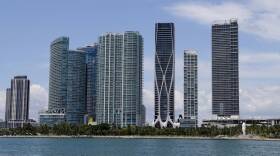-
Florida is on the verge of repealing what’s left of a 16-year-old law that puts climate change as a priority when making energy policy decisions. Instead, a bill waiting for Republican Gov. Ron DeSantis' signature would make energy affordability and availability the main focus.
-
Their proposal comes amid continued interest in expanding oil production within the Big Cypress National Preserve, an Everglades wilderness they consider sacred.
-
Climate change is heating oceans faster than the world's coral reefs can handle. So scientists are breeding corals that can withstand hotter temperatures – but only to a point.
-
Wetlands have generally kept pace with sea-level rise by building upward and creeping inland a few meters per year. But raised roadbeds, cities, farms and increasing land elevation can leave wetlands with nowhere to go.
-
New research published in the journal Nature showed the potential risk of a one-two combo of sinking land and rising seas to cities along the coast, and Miami topped the list as a location that could see quite a bit of flooded property by mid-century.
-
"Can’t Stop Change: Queer Climate Stories from the Florida Frontlines" premiered last weekend at the Tampa Bay Transgender Film Festival. It follows the film's production team on a road trip across Florida to meet with 14 LGBTQ+ artists, organizers and activists.
-
Emails show the office of Gov. Ron DeSantis suggested wording that would have banned all wind energy in the state.
-
The organism that causes red tide was found at trace levels in three counties last week.
-
FIU researchers are experimenting with "floating wetlands" to improve the water quality of Miami's canals.
-
At the Aspen Ideas: Climate summit, experts from cities that have been battered by climate change and sea-level rise gathered to share what their experiences and offer a road map of sorts for South Florida.
-
Fort Lauderdale is seeking input from experts with the Urban Land Institute, a nonprofit organization made up of land-use experts who also have offered guidance to other cities vulnerable to flooding, including New Orleans, Boston, New York City, Chicago and El Paso.
-
Research shows the soaring costs hint at widespread, unpriced risk as the global climate warms, with states like California, Florida and Louisiana hit hardest.
Play Live Radio
Next Up:
0:00
0:00
Available On Air Stations











